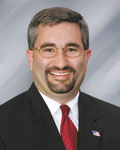May 30, 2012
Home is Where Your Heart Is
 By Curt Ford
By Curt Ford
Nash Nash Bean & Ford
Every year on each of their children’s birthdays, Tim and Elizabeth recorded their children’s growth progress on the backdoor of their family home. At age three, James was as tall as the doorknob, and Catherine brushed just below the top panel at age 12. Dennis skimmed the frame by the time he graduated high school.
For Tim and Elizabeth, their home records the heart and growth of their family, along with memories of celebrations, holidays, daily meals and activities. And while these memories are a treasured part of their life, their home also plays another key role in their life – their financial well-being. Like many people, Tim and Elizabeth’s home is their largest asset and with careful planning it can continue to shelter and protect them through-out their lives:
• During financially challenging times, a primary residence may be protected from creditors in part or in its entirety depending on the state of residence. In addition, a couple’s home may be a “tenancy by the entirety,” which prevents creditors of a single spouse from forcing the sale of the home to pay off debts. In a “tenancy by the entirety,” only creditors of both spouses may be allowed to force a sale of the property.
• If Tim and Elizabeth live in the home for two of the final five years of owning the home, they can exclude up to $500,000 in profit (or $250,000 for an individual) from capital gains taxes.
• In general, the primary residence of the couple is not considered a “countable” asset when calculating Medicaid eligibility. Some states will consider equity in primary residences if they have a value greater than $500,000 or $750,000, depending on the state.
• With their family grown and as they age, Tim and Elizabeth can take advantage of advanced estate planning by setting up a Qualified Personal Residence Trust (or QPRT). In this irrevocable trust, Tim and Elizabeth transfer their home out of their estate, with the right to remain in the home for a length of time designated in the trust. Once the residence is funded into the trust, the home – and any appreciation – will be excluded from Tim and Elizabeth’s estate and the beneficiaries will only be responsible for the value of the home at the time of transfer into the QPRT, not at the time of Tim and/or Elizabeth’s death.
While Tim and Elizabeth knew they were building a happy home for their family, they also were building a solid financial future as well. With the consultation of a qualified estate planning attorney, Tim and Elizabeth can keep their heart – and a solid financial future – in their home.
Nash Nash Bean & Ford, LLP are members of the American Academy of Estate Planning Attorneys and the National Academy of Elder Law Attorneys. To receive a copy of our most recent newsletter, “Your Estate Matters,” or for a free consultation on Estate or Long Term Care planning, call (309) 944-2188, (309) 762-9368 or 1-800-644-5345. You may also contact our firm by email at info@nashbeanford.com, or visit our website at www.nashbeanford.com.
The firm devotes its practice primarily in the areas of estate, business and tax planning and related areas of the law as well as elder law and trust administration and probate. We offer guidance and advice to our clients in every area of estate planning.
This column is designed for general information purposes only, and is not intended, nor should be construed or relied upon, as legal advice. Please consult your attorney if specific legal information is desired.
Tags: Backdoor, Birthdays, Capital Gains Taxes, Celebrations, Challenging Times, Creditors, Daily Meals, Debts, Doorknob, Home Is Where Your Heart, Irrevocable Trust, Key Role, Medicaid, Medicaid Eligibility, Nash, Personal Residence Trust, Qprt, Qualified Personal Residence Trust, Rig, Tenancy By The Entirety
Trackback URL: https://www.50pluslife.com/2012/05/30/home-is-where-your-heart-is-2/trackback/


